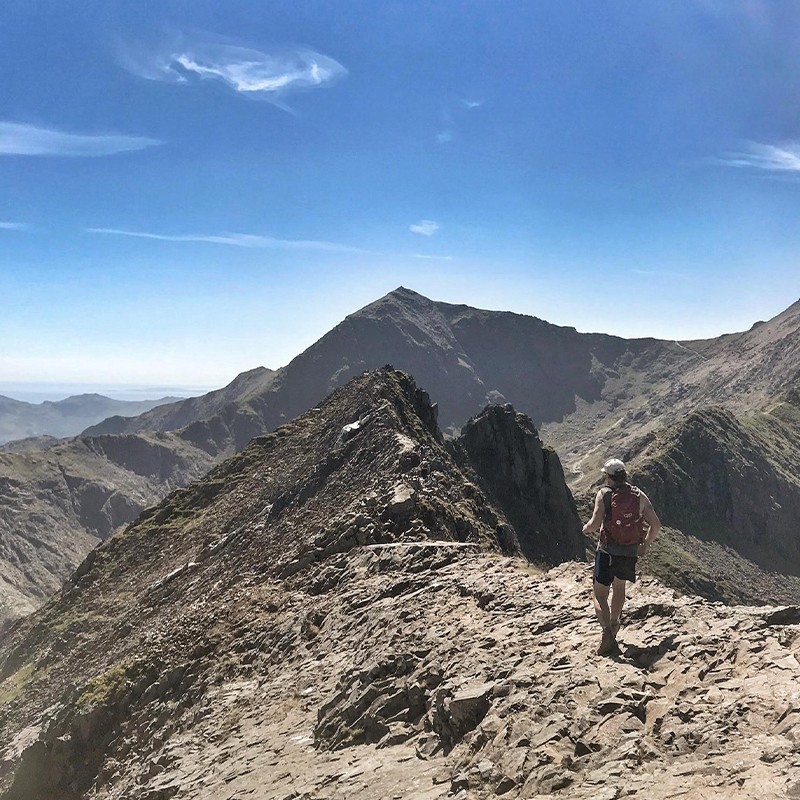How One Man Got Himself Out Of A Rut
Tell us a bit about the months before you set off on your journey, Jake…
I think they call it a major depressive episode. I prefer to say it was an all-time low. I’d been getting low for years and not really knowing what was going on or why. I felt like my personality would just disappear periodically. It came and went in waves. When I had it, it was great, but I was also on the clock, counting down to when it would leave. When it left, I’d withdraw and isolate myself. I’d heard of depression, but I hadn’t heard of anyone else with this type of thing. I wasn’t sure it was treatable if I went to the doctor, so I just learned to live with it to some extent.
Throughout these high and lows, I was working high-stress jobs, running bars. I’d be living upstairs, living with the business 365 days a year. No respite. I had a big drinking habit and a coke habit. They helped take the edge off, but I guess they were short-term comforts when I should have been thinking about long-term happiness.
Basically, I got myself into a big destructive cycle that came to a head when I was running a place in Shoreditch. One morning I just couldn’t handle it anymore. That was the first time I ever spoke to anyone about any of this. I’m not sure why I called my mum – probably just because I was scrolling through my phone, saw her name and it was comforting – and I told her I was really struggling. She booked me in to see a private doctor that day. It was like a weight was lifted, but I was still really quite poorly. I got signed off work and moved back to my mum’s.
How did you get from a bit of R&R to walking thousands of miles?
My mum lives on a Dutch barge in Maldon. Being out there in Essex, away from the noise of London, it was a bit of a sanctuary and exactly what I needed – not having any responsibility for a few weeks. In among the sitting around and being miserable, I wanted one thing I could do during the day. It ended up being taking the dog for a walk. I did this every day for a couple of weeks and started to feel a lot better.
There was a time when I was out with the dog, feeling great. I realised we’d walked six or seven miles and I just stopped. I was breathing fresh air and everything felt very simple. No noise, no industry, no traffic. I just wanted to be outside all the time.
I thought about doing one of the big national trails. Maybe I could raise some money. The idea snowballed, I bought a map of Britain from WH Smith and saw all of these places I’d never been to. The Cornish coast, the Peak District – all the national trails sounded great, so I joined them all together. I’m not an adventurer, I’m certainly not any kind of Ray Mears type and I’d never done anything like this before. But I didn’t have any responsibilities holding me back.
So you set off pretty sharpish?
It was three months from me calling my mum in the March and setting off from Brighton Pier in the June. I’d always had a bit of a cavalier attitude and that helped me. I wasn’t fit enough to walk 3,000 miles but I was so enamoured with the idea that I didn’t really think about the logistics and I didn’t give myself time to talk myself out of it. A lot of people have fanciful ideas and life gets in the way. I rationalised it as: I’d always worked hard, I’d never had a gap year or anything like that, and this was the same thing. I’d just realised I’d been fighting depression for ages, that being outside was a way to balance myself, and I wanted to understand more about all of this. Walking on my own felt like a good way to that.
What was it like when you hit the road? Daunting?
Not really, because I hadn’t given a second thought to logistics or the potential for injury or anything else. I thought this was going to be my life for six or seven months and I just wanted to do it.
Walking ten miles on that first day from Brighton to Worthing, carrying 20-25 kilos on my back, I wrecked my feet and realised the whole trip was going to be insane. But for some reason that cavalier attitude never lets me down. The pain from my feet went on for a couple of weeks, then I started to get fitter and my body adapted.
I was wild camping the whole way round, which means you never know where you’re going to end up for the night. That was scary: places that seem like lovely National Trust land in the day can change a lot at night. Your mind wanders and you start to think about what a great location this would be for some creepy clandestine activity. But I learnt which were the good places to camp and which weren’t. I managed to embrace the idea of the whole thing being an adventure and that made me pretty bulletproof against negative thoughts.
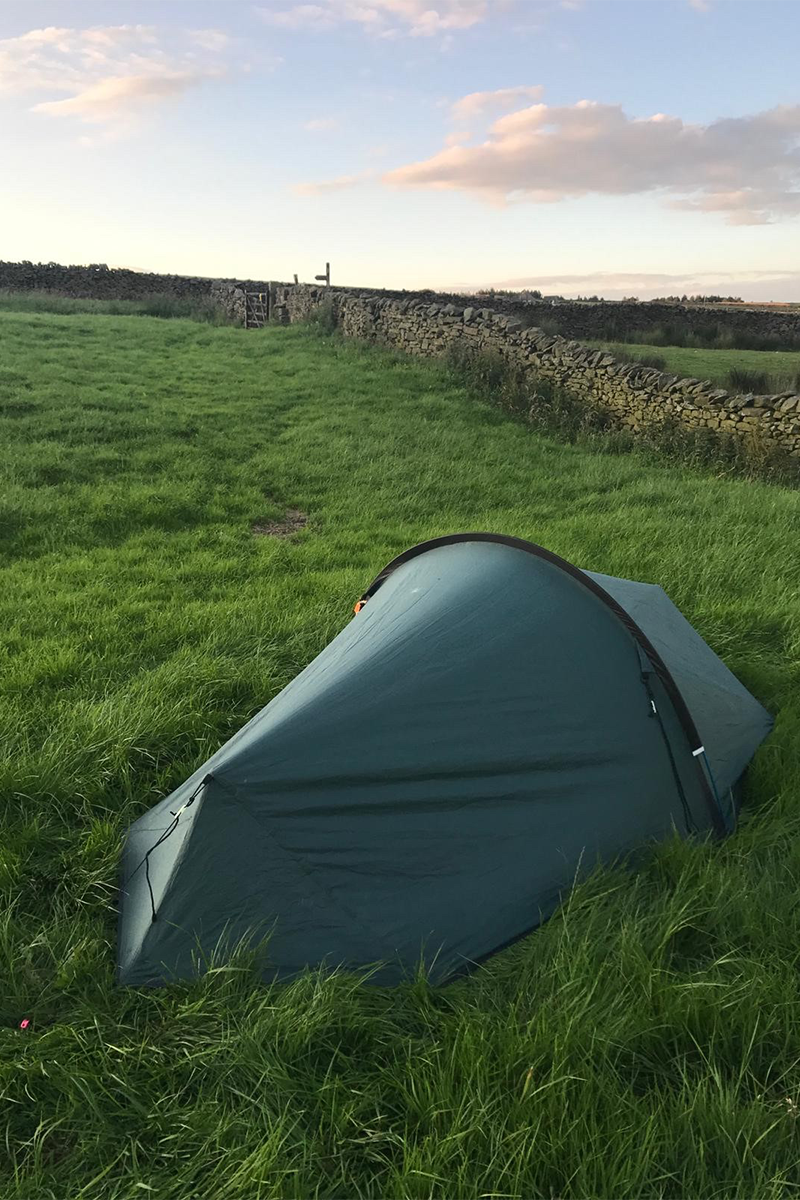
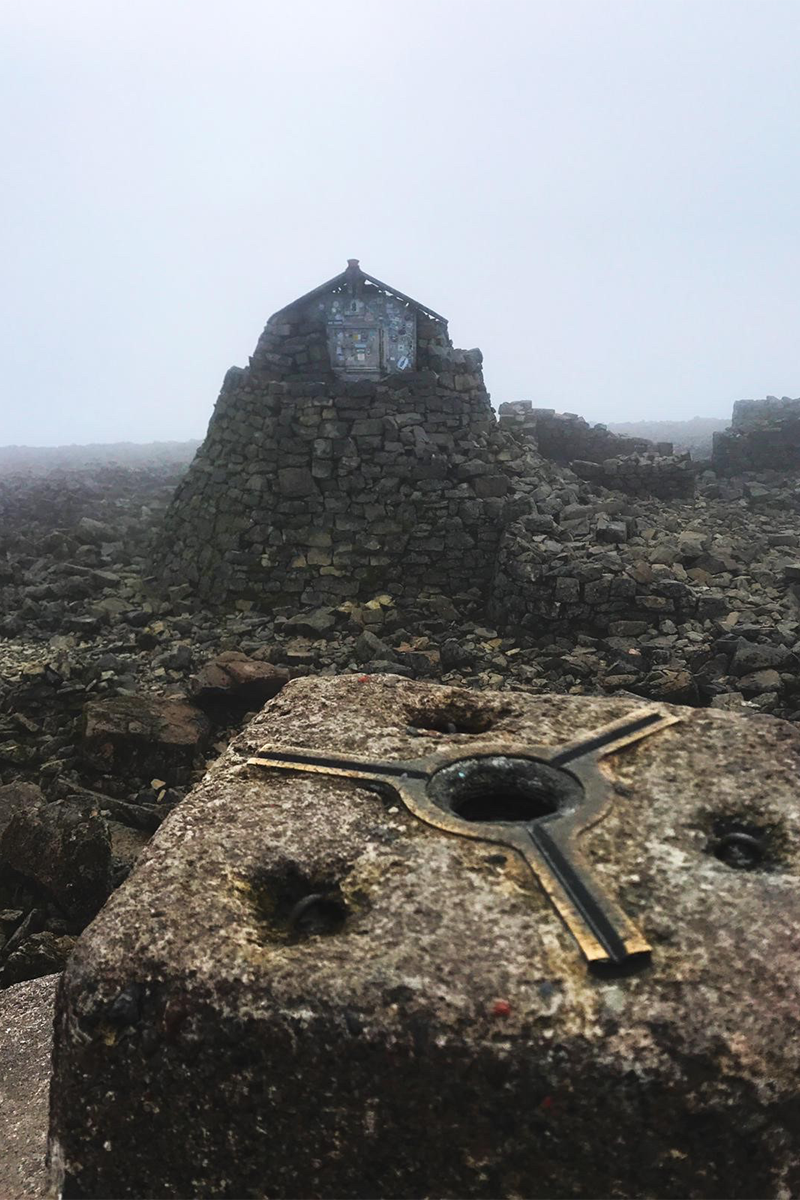
Is there one moment that you would call the hardest moment of the walk?
I’d been on the road for a long time and I bumped into a guy called Simon. I’d been following him on Facebook, he was almost 60 and he was running around Britain in the opposite direction to me. I told him I’d sort out a place for him to stay when he reached Brighton and in return he told me to look him up when I reached Scotland.
He lived in Aviemore, a beautiful part of the country. I persuaded him that, as a couple of adventurous raconteurs, we really ought to do a bit of walking together. We wanted to do Lairig Ghru, an epic mountain pass through some snowy peaks. We left a bit late to get going on the day, but I think each of us thought the other knew what the other was doing.
We were about halfway along the mountain pass when it went completely dark. The temperature dropped below freezing and it got really treacherous. Simon wasn’t happy at all – he wasn’t in the adventure headspace and felt like I’d dragged him into this situation. We made a decision to leave the track we’d been following all day in the hope we’d find a bothy we could stay in. The alternatives were walking all night and probably getting injured, or camping and probably freezing. We took the punt and found a bothy at around 10pm that night. There were a couple of guys in there already, the fire was going and we had a great evening swapping stories.
Are you still in touch with Simon?
I am. After he did his lap of Britain, he ran around Ireland. He was 60 by that point. He’s an incredible guy, very young for his age, and I suppose very romantic and otherworldly. He sees the world in a certain way and he maintains a little barrier so that he can always see the magic in it. He’s a really positive influence to be around.
Would you do your walk again? Or something similar?
It was a real privilege to be out there with nothing holding me back – and to be doing it without having to think about certain fears, which really I was able to dismiss as a male. I appreciate that being out there alone wouldn't feel safe for everyone. I got to see Britain and meet a lot of people. I still had highs and lows to contend with, because I get depressed but also just the smell of damp and mould, or the unbearable cold or the unbelievable heat. On the whole though, it was a life-changing, brilliant experience. It’s got me excited to see the rest of the country.
If I was going to take on a big adventure again, though, it probably wouldn’t be as introspective. I’ve heard enough about myself now. I’m interested to hear other people’s experiences. I’d love to explore and investigate Iceland. You always hear about how Scandinavian countries are the happiest on the planet. They score so well on socio-economic indicators, equality and mental health, but at the same time Iceland has a very high suicide rate and a massive substance abuse problem. I think there’s something to be looked at and learnt there.
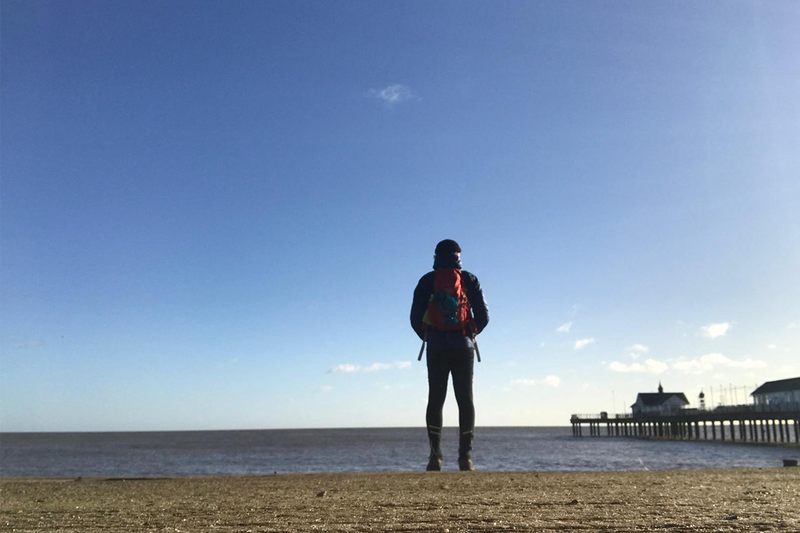
What was your favourite place that you discovered on the walk?
Probably the West Highland Way. It’s a national trail that runs from just north of Glasgow up to Fort William. Loch Lomond and Ben Nevis are right there, and it’s stunning. Scotland as a whole was brilliant. The beautiful landscape got me thinking and reading about the history of the country. There’s something about the sound of bagpipes now when I hear them.
You said the walk was life-changing. How have things changed for you since you finished it?
It’s been three years and I’ve definitely got a lot more accepting of myself. I used to hate myself for my personality leaving all the time. I probably looked quite consistent to other people because I suffered in private, but now I’m not ashamed any more. Without the crisis point, though, I wouldn’t have done the walk, and the walk unlocked some potential in me I didn’t know I had. I really surprised myself with what I was physically capable of.
Fitness is a much bigger part of my life now. I never feel better than when I’ve been for a run. It’s the endorphins, of course, but I’m amazed at what my body can do and that’s partly why my self-esteem is higher than it’s ever been.
The self-esteem means I don’t mind talking about how I feel now and that is just a huge weight off. It also means people can confide in me a bit more and this has led to much more meaningful relationships with friends. Instead of everyone pretending they’re great all of the time, they might show a bit of vulnerability and that creates much stronger foundations for friendship. I used to hide my vulnerability because I thought everyone would think I was a downer, but actually it shows people you’re going through the same thing. The upshot of all this is that I’m a lot more contented.
What do you day to day to look after yourself now?
I’m not perfect at this. I’m very good at talking about talking about mental health, i.e. talking about how effective it is to be open about your emotions and vulnerabilities. But as soon as I’m on a downswing, I can still clam up. Luckily, I’ve got a rock of a partner. She’s incredibly supportive and understanding, and she knows what I need, pushing me to go for a run when I don’t want to and reminding me to do the things I’m always talking about doing.
A downswing today doesn’t come with the same deep knot in my stomach and panic. I understand myself better. I’ve accepted depression is an ongoing thing and I’ve realised what I need to do to get through life.
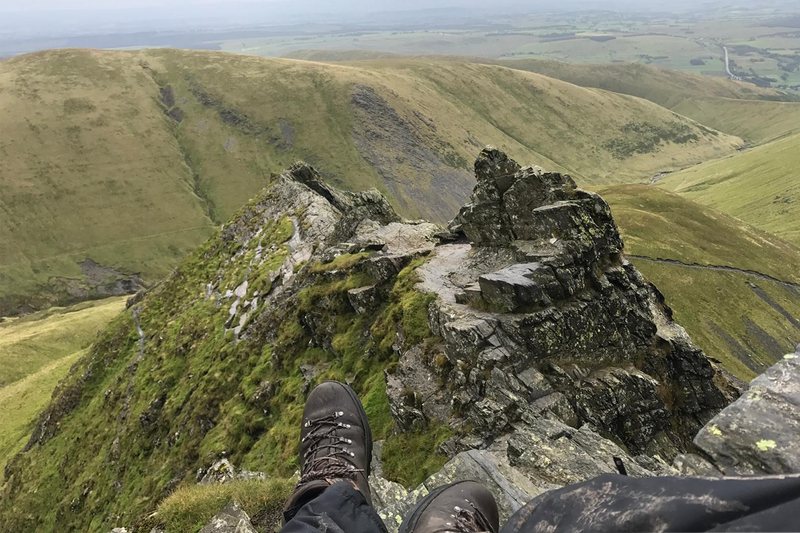
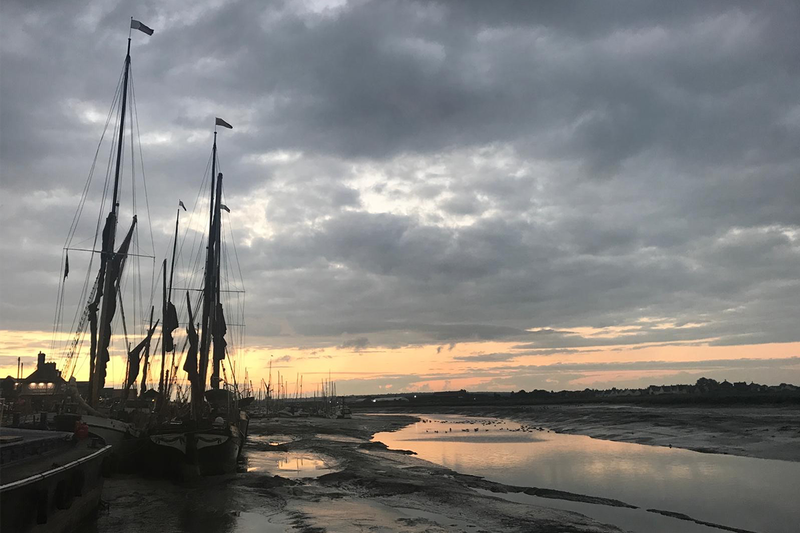
Are there any more practical things you’ve found that are working?
In the last couple of months, I’ve just started taking CBD oil. A friend of mine wrote a piece on micro-dosing LSD, which a lot of people swear by now. All of the effects he described made it sound like exactly the thing I needed. But LSD can be quite hard to get hold of, and someone told me you can get similar effects from CBD oil. There was an anger that used to be the ugliest part of my depression and that I hated – since I’ve been taking CBD, it seems to have gone for the most part. I’ve also been sleeping like a hibernating bear and that’s a game-changer too.
I’m also walking, running and swimming and exerting myself whenever possible. I live in Brighton, so I’m by the sea and we’ve got the South Downs on our doorstep. We’re in the downs a lot.
All of this has helped me let go of a lot of stuff. I’m not cut out for high-stress, high-octane living, but that’s a standard that a lot us aspire to and measure ourselves by. I’ve accepted now that, for me to do that and perhaps make the big money, I would have to put my mind through some serious stress. I’m no longer prepared to do that. I prefer to live and have time to do the things I want to do in order to be content and happy.
For some people, seeing the money roll in gives them a big dopamine hit, but we need to remember the lifestyle it demands doesn’t fix everything for everyone. Instead of getting down on myself about not being cut out for that, I’m actually quite proud for going, okay, that’s awesome for you, but I don’t really want all of that if it also means being a nervous wreck.
More generally, then, it’s good we’re starting to talk a bit more about mental health?
As I said about myself, I think it’s important to distinguish between talking about mental health, and talking about talking about mental health. The first one is still a lot harder to do than the second one because we don’t personally want to appear vulnerable or pathetic or anything like that.
Towards the end of the walk, I was at peak fitness and I decided to run home from Edinburgh. I had a bit of a social media following at that point and people could follow me. As I passed through towns, I’d be helped out and put up by total strangers for the night. So many of the people I met in those five weeks knew I was on a sort of mental health-framed adventure, and they had something they wanted to talk about. It was much easier for them to drop their guard to a transient guy they probably won’t see again than to a friend or someone they loved. There wasn’t the same fear of being judged, which I think is still a big fear for a lot of people.
I can’t remember all of the names and faces of the people I met at that time, but they were a diverse mix. I spoke to them and they spoke to me about things I had never talked about for 30 years, which had made me feel so alone. As I said in my Ted talk, depression’s best trick is convincing everyone that they’re the sole member of the biggest club in the world. If you can see that, the world opens up for you.
Have you got any advice for anyone who might be struggling?
I’m not a huge fan of giving advice because I think everybody needs a slightly different approach. Personally, if I’m low, I kind of like having the piss taken out of me. I’ve got certain friends who can do this to me, make me laugh about myself and I’ll snap out of it. But I can see that getting mugged off by your mates is not an approach that’s going to work for everyone.
I think trying to understand what you need is a good starting point. If you’re the sort of person who needs reassurance, ask for reassurance. If you need to be around people who make you laugh, surround yourself with them.
And put trust in the people you love. They do like you. They do care about you. If they hear you’re going through something tough and you’re hiding it from them, it’s probably going to hurt them as well. Because they want to help you.
Finally, Jake, any guidance for someone who might know someone who’s struggling?
That’s a good question. A lot is done for people who are struggling, but there’s been very little offered to the people around those people. Just being present is probably the simplest thing I can say. I don’t think you have to sit people down and try to get them to start talking. Be gentle in your encouragement: perhaps a surprise gift, or a visit, or some other little step up in friendship that lets them know you’ve noticed something might be off. My partner is very good at being around a bit more, but not swamping me. She might bring me a cup of tea when I’m not expecting it and that makes me much more inclined to have a conversation that isn’t stilted or forced. So, yeah. Up your friendship. Be more present. That’s a cool piece of advice.
Check out A Walk From The Wild Edge by Jake Tyler here.
DISCLAIMER: We endeavour to always credit the correct original source of every image we use. If you think a credit may be incorrect, please contact us at [email protected].
